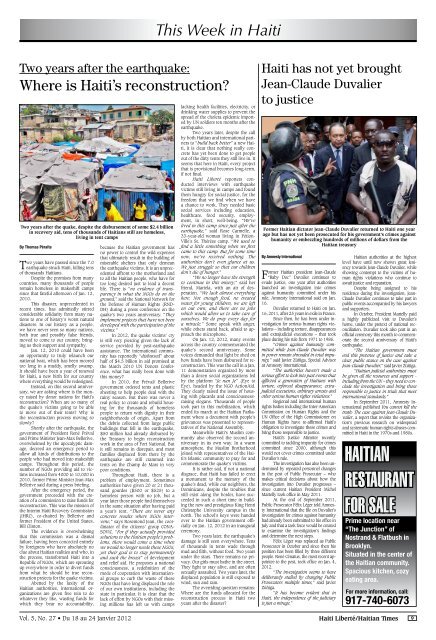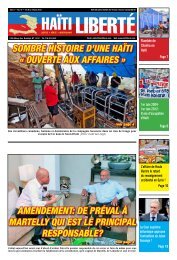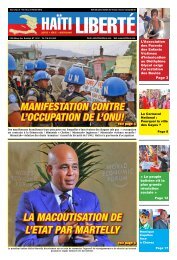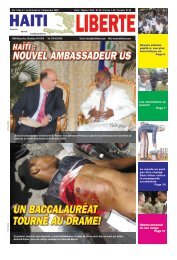Grave acciDent à Delmas ! - Haiti Liberte
Grave acciDent à Delmas ! - Haiti Liberte
Grave acciDent à Delmas ! - Haiti Liberte
Create successful ePaper yourself
Turn your PDF publications into a flip-book with our unique Google optimized e-Paper software.
This Week in <strong>Haiti</strong><br />
Two years after the earthquake:<br />
Where is <strong>Haiti</strong>’s reconstruction?<br />
Two years after the quake, despite the disbursement of some $2.4 billion<br />
in recovery aid, tens of thousands of <strong>Haiti</strong>ans still are homeless,<br />
living in tent camps<br />
By Thomas Péralte<br />
Two years have passed since the 7.0<br />
earthquake struck <strong>Haiti</strong>, killing tens<br />
of thousands <strong>Haiti</strong>ans.<br />
Despite the promises from many<br />
countries, many thousands of people<br />
remain homeless in makeshift camps<br />
since that fateful afternoon of Jan. 12,<br />
2010.<br />
This disaster, unprecedented in<br />
recent times, has admittedly stirred<br />
considerable solidarity from many nations<br />
to one of history’s worst natural<br />
disasters. In our history as a people,<br />
we have never seen so many nations,<br />
both true and possibly false friends,<br />
moved to come to our country, bringing<br />
us their support and sympathy.<br />
Jan. 12, 2010 could have been<br />
an opportunity to truly relaunch our<br />
national boat, which has been moored<br />
too long in a muddy, smelly swamp.<br />
It should have been a year of renewal<br />
for <strong>Haiti</strong>, a new birth for our country<br />
where everything would be redesigned.<br />
Instead, on this second anniversary,<br />
we are asking where is the money<br />
raised by donor nations for <strong>Haiti</strong>’s<br />
reconstruction? When are so many of<br />
the quake’s victims going to be able<br />
to move out of their tents? Why is<br />
the reconstruction process moving so<br />
slowly?<br />
Shortly after the earthquake, the<br />
government of President René Préval<br />
and Prime Minister Jean-Max Bellerive,<br />
overwhelmed by the apocalyptic damage,<br />
decreed an emergency period to<br />
allow all kinds of distributions to the<br />
people who had moved into makeshift<br />
camps. Throughout this period, the<br />
number of NGOs providing aid to victims<br />
increased from 4000 to 10,000 in<br />
2010, former Prime Minister Jean-Max<br />
Bellerive said during a press briefing.<br />
After the emergency period, the<br />
government proceeded with the creation<br />
of a commission to raise funds for<br />
reconstruction. This was the mission of<br />
the Interim <strong>Haiti</strong> Recovery Commission<br />
(IHRC), co-chaired by Bellerive and<br />
former President of the United States,<br />
Bill Clinton.<br />
The evidence is overwhelming<br />
that this commission was a dismal<br />
failure, having been concocted entirely<br />
by foreigners who have absolutely no<br />
clue about <strong>Haiti</strong>an realities and who, in<br />
the process, transformed <strong>Haiti</strong> into a<br />
Republic of NGOs, which are sprouting<br />
up everywhere in order to divert funds<br />
from what be should be true reconstruction<br />
projects for the quake victims.<br />
Abetted by the laxity of the<br />
<strong>Haiti</strong>an authorities, international organizations<br />
are given free rein to do<br />
whatever they like, wasting funds for<br />
which they bear no accountability,<br />
because the <strong>Haiti</strong>an government has<br />
no power to control the wild expenses<br />
that ultimately result in the building of<br />
miserable shelters that only demean<br />
the earthquake victims. It is an unprecedented<br />
affront to the motherland and<br />
to all the <strong>Haiti</strong>an people, who have for<br />
too long desired just to lead a decent<br />
life. There is “no evidence of transparency<br />
in what the NGOs do on the<br />
ground,” said the National Network for<br />
the Defense of Human Rights (RND-<br />
DH) during a press conference on the<br />
quake’s two years anniversary. “They<br />
implement projects that have not been<br />
developed with the participation of the<br />
victims.”<br />
In 2012, the quake victims’ cry<br />
is still very piercing given the lack of<br />
service provided by post-earthquake<br />
assistance. The international community<br />
has reportedly “disbursed” about<br />
half of $4.5 billion in aid promised at<br />
the March 2010 UN Donors Conference.<br />
what has really been done with<br />
this money?<br />
In 2010, the Préval/ Bellerive<br />
government ordered tents and plastic<br />
sheeting to help people deal with the<br />
rainy season. But there was never a<br />
real policy to create and rebuild housing<br />
for the thousands of homeless<br />
people to return with dignity in their<br />
neighborhoods of origin. Apart from<br />
the debris collected from large public<br />
buildings that fell in the earthquake,<br />
$50 million had already disbursed by<br />
the Treasury to begin reconstruction<br />
work in the area of Fort National. But<br />
it still remains in disrepair, and most<br />
families displaced from there by the<br />
earthquake are still crammed into<br />
tents on the Champ de Mars in very<br />
poor conditions.<br />
Throughout <strong>Haiti</strong>, there is a<br />
problem of employment. Sometimes<br />
authorities have given 20 or 21 thousand<br />
gourdes ($500 or $525) to a<br />
homeless person with no job, but a<br />
year later those people find themselves<br />
in the same situation after having paid<br />
a year’s rent. “There are never any<br />
concrete results where NGOs intervene,”<br />
says Rosemond Jean, the coordinator<br />
of the citizens’ group CONA-<br />
SOVIC. “For if they actually provided<br />
solutions to the <strong>Haiti</strong>an people’s problems,<br />
there would come a time when<br />
we would no longer needs these NGOs,<br />
yet their goal is to stay permanently<br />
and suck the breast” of development<br />
and relief aid. He proposes a national<br />
consciousness, a redefinition of the<br />
mode of cooperation with international<br />
groups to curb the waste of these<br />
NGOs that have long displaced the role<br />
of our own institutions, including the<br />
state in particular. It is clear that the<br />
lack of effort by NGOs with their missing<br />
millions has left us with camps<br />
lacking health facilities, electricity, or<br />
drinking water supplies to prevent the<br />
spread of the cholera epidemic imported<br />
by UN soldiers ten months after the<br />
earthquake.<br />
Two years later, despite the call<br />
by both <strong>Haiti</strong>an and international partners<br />
to “build back better” a new <strong>Haiti</strong>,<br />
it is clear that nothing really concrete<br />
has yet been done to get people<br />
out of the dirty tents they still live in. It<br />
seems that here in <strong>Haiti</strong>, every project<br />
that is provisional becomes long-term,<br />
if not final.<br />
<strong>Haiti</strong> Liberté reporters conducted<br />
interviews with earthquake<br />
victims still living in camps and found<br />
them hungry for social justice, for the<br />
freedom that we find when we have<br />
a chance to work. They needed basic<br />
social services including education,<br />
healthcare, food security, employment,<br />
in short, well-being. “We’ve<br />
lived in this camp since just after the<br />
earthquake,” said Rose Carmelle, a<br />
33-year-old woman living in Pétion-<br />
Ville’s St. Thérèse camp. “We used to<br />
find a little something when we first<br />
came to this camp. But for some time<br />
now, we’ve received nothing. The<br />
authorities don’t even glance at us.<br />
We just struggle so that our children<br />
don’t die of hunger.”<br />
“We no longer have the strength<br />
to continue in this misery,” said her<br />
friend, Mariela, with an air of desperation.<br />
“We lack almost everything<br />
here. Not enough food, no treated<br />
water for young children, we are left<br />
on our own, and there are no jobs<br />
which would allow us to take care of<br />
ourselves. We do pray every day for<br />
a miracle.” Some speak with anger,<br />
while others stand back, afraid to approach<br />
the microphone.<br />
On Jan. 12, 2012, many events<br />
across the country commemorated the<br />
quake’s second anniversary. Some<br />
voices demanded that light be shed on<br />
how funds have been disbursed for reconstruction.<br />
This was the call in a Jan.<br />
11 demonstration organized by more<br />
than a dozen social organizations led<br />
by the platform “Je nan Je” (Eye to<br />
Eye), headed by the NGO ActionAid.<br />
They clearly raised the issue of housing<br />
with placards and consciousnessraising<br />
slogans. Thousands of people<br />
took part in this mobilization, which<br />
ended its march at the <strong>Haiti</strong>an Parliament<br />
where a document with people’s<br />
grievances was presented to representatives<br />
of the National Assembly.<br />
Meanwhile <strong>Haiti</strong>’s Muslim community<br />
also observed the second anniversary<br />
in its own way. In a warm<br />
atmosphere, the Muslim Brotherhood<br />
joined with representatives of the <strong>Haiti</strong>’s<br />
Islamic community to pray for and<br />
commemorate the quake’s victims.<br />
It is rather sad, if not a national<br />
disgrace, that <strong>Haiti</strong> has failed to erect<br />
a monument to the memory of the<br />
quake’s dead, while our neighbors, the<br />
Dominicans, despite the troubles that<br />
still exist along the border, have succeeded<br />
in such a short time in building<br />
the new and prestigious King Henri<br />
Christophe University campus in the<br />
north. The school’s keys were handed<br />
over to the <strong>Haiti</strong>an government officially<br />
on Jan. 12, 2012 in an inaugural<br />
ceremony.<br />
Two years later, the earthquake’s<br />
damage is still seen everywhere. Tens<br />
of thousands in tents wade through<br />
mud and filth, without food. Two years<br />
under the stars. There remains no privacy.<br />
Our girls must bathe in the street.<br />
They fight to stay alive, and are often<br />
sexually assaulted. Two years later, the<br />
displaced population is still exposed to<br />
wind, sun and rain.<br />
The overriding question remains:<br />
Where are the funds allocated for the<br />
reconstruction process in <strong>Haiti</strong> two<br />
years after the disaster?<br />
<strong>Haiti</strong> has not yet brought<br />
Jean-Claude Duvalier<br />
to justice<br />
Former <strong>Haiti</strong>an dictator Jean-Claude Duvalier returned to <strong>Haiti</strong> one year<br />
ago but has not yet been prosecuted for his government’s crimes against<br />
humanity or embezzling hundreds of millions of dollars from the<br />
<strong>Haiti</strong>an treasury<br />
By Amnesty International<br />
Former <strong>Haiti</strong>an president Jean-Claude<br />
“Baby Doc” Duvalier continues to<br />
evade justice, one year after authorities<br />
launched an investigation into crimes<br />
against humanity committed under his<br />
rule, Amnesty International said on Jan.<br />
16.<br />
Duvalier returned to <strong>Haiti</strong> on Jan.<br />
16, 2011, after 25 years in exile in France.<br />
Since then, he has been under investigation<br />
for serious human rights violations<br />
– including torture, disappearances<br />
and extrajudicial executions – that took<br />
place during his rule from 1971 to 1986.<br />
“Crimes against humanity committed<br />
while Jean-Claude Duvalier was<br />
in power remain shrouded in total impunity,”<br />
said Javier Zúñiga, Special Advisor<br />
at Amnesty International.<br />
“The authorities haven’t made a<br />
serious effort to look into past events that<br />
afflicted a generation of <strong>Haiti</strong>ans with<br />
torture, enforced disappearance, extrajudicial<br />
executions, arbitrary arrests and<br />
other serious human rights violations.”<br />
Regional and international human<br />
rights bodies including the Inter-American<br />
Commission on Human Rights and the<br />
UN Office of the High Commissioner on<br />
Human Rights have re-affirmed <strong>Haiti</strong>’s<br />
obligation to investigate these crimes and<br />
bring those responsible to justice.<br />
<strong>Haiti</strong>’s Justice Minister recently<br />
committed to tackling impunity for crimes<br />
committed since 2000, although this<br />
would not cover crimes committed under<br />
Duvalier’s rule.<br />
The investigation has also been undermined<br />
by repeated personnel changes<br />
in the post of Public Prosecutor – who<br />
makes critical decisions about how the<br />
investigation into Duvalier progresses –<br />
since current <strong>Haiti</strong>an President Michel<br />
Martelly took office in May 2011.<br />
At the end of September 2011,<br />
Public Prosecutor Félix Léger told Amnesty<br />
International that the file on Duvalier’s<br />
investigation for crimes against humanity<br />
had already been submitted to his office in<br />
July and that a task force would be created<br />
to examine the investigation’s findings<br />
and determine the next steps.<br />
Félix Léger was replaced as Public<br />
Prosecutor in October and since then his<br />
position has been filled by three different<br />
people. René Cénatus, the most recent appointee<br />
to the post, took office on Jan. 4,<br />
2012.<br />
“The investigation seems to have<br />
deliberately stalled by changing Public<br />
Prosecutors multiple times,” said Javier<br />
Zúñiga.<br />
“It has become evident that in<br />
<strong>Haiti</strong>, the independence of the judiciary<br />
is just a mirage.”<br />
<strong>Haiti</strong>an authorities at the highest<br />
level have until now shown great leniency<br />
towards Jean-Claude Duvalier, while<br />
showing contempt to the victims of human<br />
rights violations who continue to<br />
await justice and reparation.<br />
Despite being assigned to his<br />
residence during the investigation, Jean-<br />
Claude Duvalier continues to take part in<br />
public events accompanied by his lawyers<br />
and supporters.<br />
In October, President Martelly paid<br />
a highly publicized visit to Duvalier’s<br />
home, under the pretext of national reconciliation.<br />
Duvalier took also part in an<br />
official ceremony this month to commemorate<br />
the second anniversary of <strong>Haiti</strong>’s<br />
earthquake.<br />
“The <strong>Haiti</strong>an government must<br />
end this pretense of justice and take a<br />
clear, public stance on the case against<br />
Jean-Claude Duvalier,” said Javier Zúñiga.<br />
“<strong>Haiti</strong>an judicial authorities must<br />
be given all the resources and support -<br />
including from the UN – they need to conclude<br />
the investigation and bring those<br />
responsible to justice in trials that meet<br />
international standards.”<br />
In September 2011, Amnesty International<br />
published You cannot kill the<br />
truth: The case against Jean-Claude Duvalier,<br />
a report that revisits the organization’s<br />
previous research on widespread<br />
and systematic human rights abuses committed<br />
in <strong>Haiti</strong> in the 1970s and 1980s.<br />
HAITIAN<br />
RESTAURANT<br />
FOR SALE<br />
Prime location near<br />
“The Junction” of<br />
Nostrand & Flatbush in<br />
Brooklyn.<br />
Situated in the center of<br />
the <strong>Haiti</strong>an community.<br />
Spacious kitchen, cozy<br />
eating area.<br />
For more information, call:<br />
917-740-6073<br />
Vol. 5, No. 27 • Du 18 au 24 Janvier 2012 <strong>Haiti</strong> Liberté/<strong>Haiti</strong>an Times 9

















